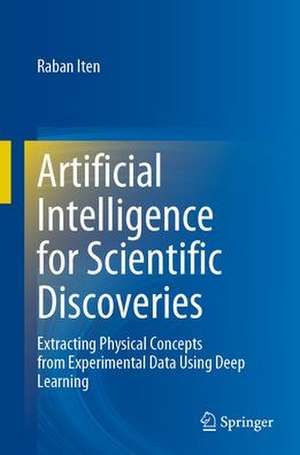Artificial Intelligence for Scientific Discoveries: Extracting Physical Concepts from Experimental Data Using Deep Learning
Autor Raban Itenen Limba Engleză Hardback – 12 apr 2023
Preț: 690.54 lei
Preț vechi: 863.17 lei
-20% Nou
Puncte Express: 1036
Preț estimativ în valută:
132.18€ • 143.62$ • 111.10£
132.18€ • 143.62$ • 111.10£
Carte disponibilă
Livrare economică 01-15 aprilie
Livrare express 15-21 martie pentru 29.65 lei
Preluare comenzi: 021 569.72.76
Specificații
ISBN-13: 9783031270185
ISBN-10: 3031270185
Pagini: 170
Ilustrații: XIII, 170 p. 38 illus., 37 illus. in color.
Dimensiuni: 155 x 235 x 18 mm
Greutate: 0.44 kg
Ediția:2023
Editura: Springer International Publishing
Colecția Springer
Locul publicării:Cham, Switzerland
ISBN-10: 3031270185
Pagini: 170
Ilustrații: XIII, 170 p. 38 illus., 37 illus. in color.
Dimensiuni: 155 x 235 x 18 mm
Greutate: 0.44 kg
Ediția:2023
Editura: Springer International Publishing
Colecția Springer
Locul publicării:Cham, Switzerland
Cuprins
Introduction.- Machine Learning Background.- Overview of Using Machine Learning for Physical Discoveries.- Theory: Formalizing the Process of Human Model Building.- Methods: Using Neural Networks to Find Simple Representations.- Applications: Physical Toy Examples.- Open Questions and Future Prospects.
Notă biografică
Raban Iten studied Physics and Mathematics at ETH Zürich, followed by a Ph.D. in quantum computation. During his Ph.D., he worked on using machine learning to discover physical concepts from experimental data of classical and quantum systems. This work was widely covered in the media and pointed out as a research highlight of 2019 by Nature Reviews Physics. Furthermore, he developed algorithms for quantum compilers and contributed to various open-source libraries for quantum computing.
Textul de pe ultima copertă
Will research soon be done by artificial intelligence, thereby making human researchers superfluous? This book explains modern approaches to discovering physical concepts with machine learning and elucidates their strengths and limitations. The automation of the creation of experimental setups and physical models, as well as model testing are discussed. The focus of the book is the automation of an important step of the model creation, namely finding a minimal number of natural parameters that contain sufficient information to make predictions about the considered system. The basic idea of this approach is to employ a deep learning architecture, SciNet, to model a simplified version of a physicist's reasoning process. SciNet finds the relevant physical parameters, like the mass of a particle, from experimental data and makes predictions based on the parameters found. The author demonstrates how to extract conceptual information from such parameters, e.g., Copernicus' conclusion that the solar system is heliocentric.
Caracteristici
Provides an overview for scientists of how machine learning can help to discover physical concepts Introduces a general framework that can help the reader to extract relevant parameters from experimental data The content of the book is easily accessible even to scientists without background knowledge in machine learning
